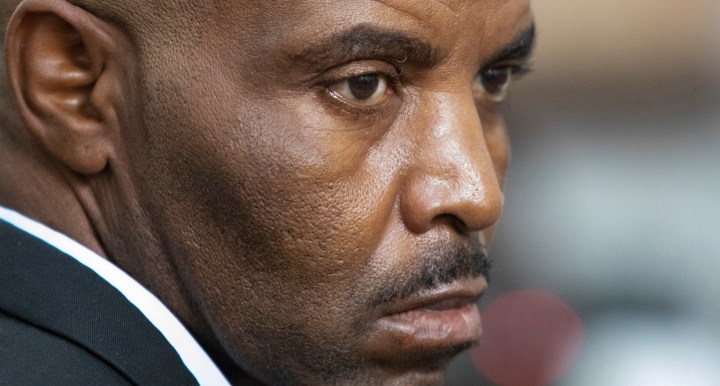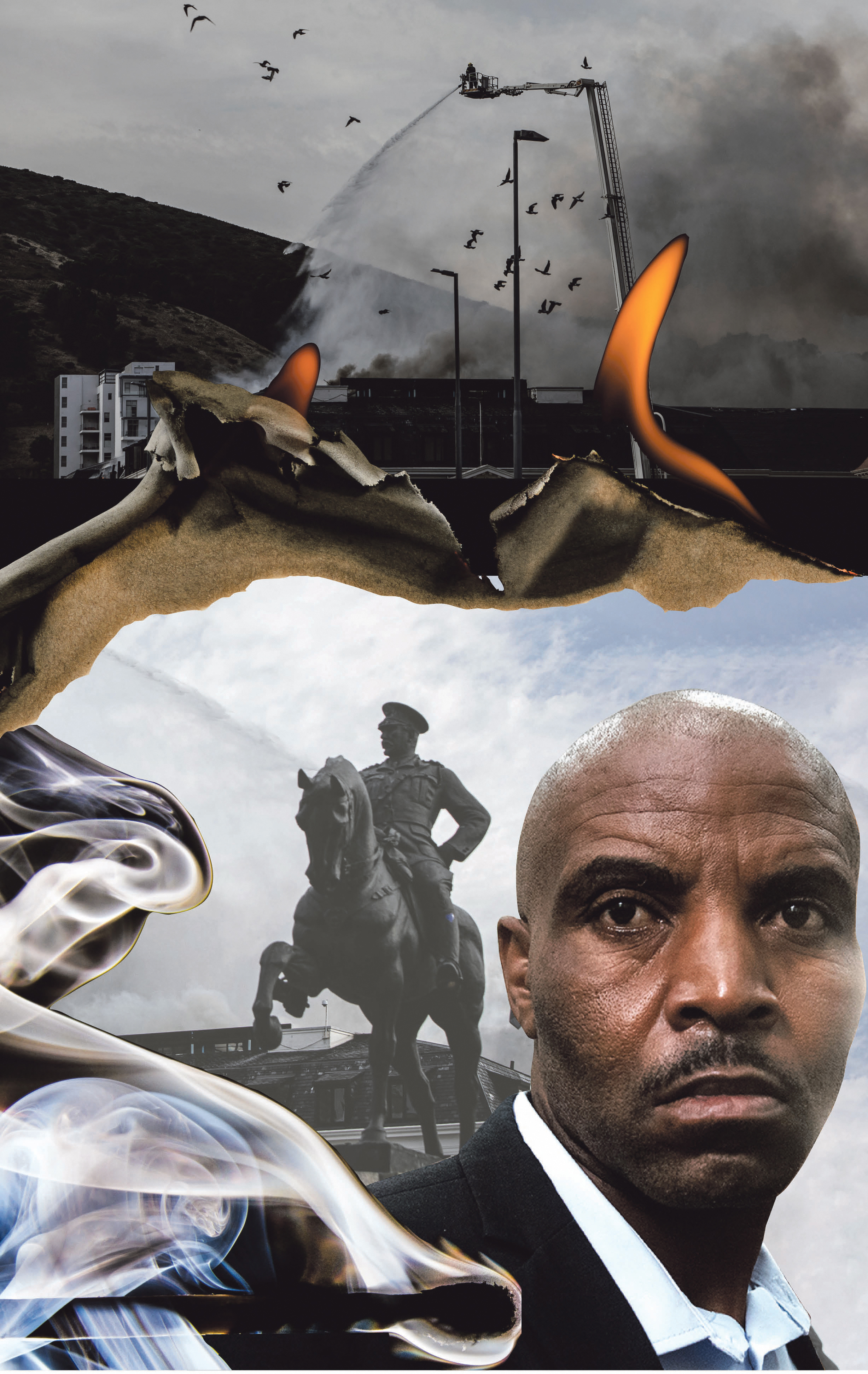DEEP DIVE
Trials by fire: The mystery of Zandile Mafe and the burning rage of a traumatised nation

Zandile Mafe, the alleged Parliament arsonist, remains an enigma. He has become a symbol of every person affected by an apartheid government and left behind by successive ANC-led states.
In the pre-trial spotlight, terror accused Zandile Mafe epitomises a riddle, wrapped in a mystery inside an enigma.
For now.
Burning down Parliament, as Mafe is alleged to have done on 2 January 2022, is a brazen act of major symbolic significance. It is also an act of terrorism that carries a life sentence. Pretty high stakes. In the real world.
As angry flames engulfed the iconic building in Cape Town while members of the EFF and former president Jacob Zuma’s family celebrated, several significant and historic political currents converged in the country.
An epoch of great and respected anti-apartheid leaders came to an end on 26 December – Day of Goodwill – when Desmond Tutu died peacefully at the age of 90.
The country greeted the new year without Tutu and on 1 January his funeral took place at St George’s Cathedral where he now lies interred after being “aquamated”.
Tutu’s departure, as one of the sturdy pegs grounding our young and troubled democracy, left us (hopefully only temporarily) bereft of a lodestar, a common language, a dogged commitment to truth, justice and sanity.
The following day the fire raged through Parliament.
Two days later, Deputy Chief Justice Raymond Zondo handed a damning Part One of the report by the Commission of Inquiry into State Capture to President Cyril Ramaphosa.
Inside, 870 pages laid bare nine wasted years of gargantuan corruption at SAA, the capture of SARS and how the Gupta-owned New Age newspaper hoovered up tax revenue under Zuma’s permissive watch.
Since his arrest in the early hours of 2 January outside Parliament, Mafe has, to many, come to symbolise every (wo)man, hobbled by an apartheid past and who has been left behind and failed by successive ANC-led governments.
Observers of history will immediately call to mind the 1933 fire that razed the German parliament four weeks after Adolf Hitler was sworn in as chancellor.
Blaming the fire on the communists, the subsequent Reichstag Fire Decree was used by the Nazis to abolish constitutional protections, paving a clear path for Der Führer.
After his arrest, the 49-year-old Mafe, who hails from North West, became a tabula rasa, a blank slate on to whom a kaleidoscope of thoughts, feelings, slights and rages have been projected and attributed.
To some, the Parliament blaze was just one of many successive national traumas including Covid-19, rolling electricity outages, crumbling infrastructure, shameless corruption, shocking unemployment, catastrophic violence and a failed insurrection that claimed more than 300 lives in July 2021. What’s to be done?
Just a day in the life
Much to the bemused exasperation of Cape Talk host Lester Kiewit, some in Cape Town carried on as usual, trekking off to beaches to soak up the holiday sun; others hiked in the mountains, skied, rowed or sailed in the waves just off Robben Island while a plume of smoke collected over the city.
The indifference on the one hand, and the celebration of the blaze on the other, is a measure of just how much the authority of the state and those who lead it has been diminished in the eyes of the citizens as we set off on 2022.

Background: Firefighters battle the blaze engulfing the National Assembly in Parliament on 3 January 2022. (Photo: Leila Dougan). Foreground: Zandile Mafe appears in the Cape Town Magistrates’ Court on 11 January 2022. (Photo: Brenton Geach / Gallo Images). Graphics: Pixabay, iStock.
Mafe himself has insisted he is perfectly sane, although for now, the exact motive for setting the fire remains suitably baffling, untethered to any political leaning either left, right or anywhere else on the spectrum.
The terror accused sways like a sapling in a hurricane claiming the violent white supremacist AWB leader Eugene Terre’Blanche as a “friend” and allegedly demanding the release of Janusz Waluś, the right-wing assassin who murdered beloved SACP leader Chris Hani in April 1993.
Mafe was 22 in 1994 when Nelson Mandela was elected the first president of democratic South Africa. He would have been on the threshold of an adult working life in a free South Africa full of promise, apparently.
Mafe’s surprising encounter with Terre’Blanche must have been prior to 2010 when the Afrikaner populist was murdered on his farm in the Free State by a worker.
The encounter would most likely have occurred during Mafe’s time in the Free State in search of work, as set out in court.
Mafe’s mental health has been contested from the moment he first appeared in court, dishevelled and apparently startled and confused.
His pro bono legal team, led by Advocate Dali Mpofu, has insisted on multiple occasions that Mafe is perfectly sane and not a “paranoid schizophrenic” as previously diagnosed by a state doctor after his arrest. The last person to breach Parliament’s sanctity in such a catastrophic manner for the government of the day was Dimitri Tsafendas in 1966 when he stabbed Hendrik Verwoerd to death in the old Assembly chamber.
In that instance, the state could not dare admit to its citizens that a known communist had slipped into the country, gained employment in Parliament and assassinated the “architect” of apartheid in full view of his Cabinet.
Tsafendas was quickly diagnosed as a paranoid schizophrenic who had been prompted by a tapeworm – and not ideology, commitment or belief – to kill the beloved and avuncular Verwoerd. An initial assessment of Tsafendas, however, had found him of sound mind.
Conspiracy theorists initially posited that the state in the Mafe matter might attempt to remove the case from the public eye by having him declared mentally ill in some kind of “cover-up”.
But Mafe, unlike Tsafendas in 1966, has access to justice in full view of the public.
The accused, who has a speech impediment and speaks four languages, has assured the court repeatedly that he is following proceedings. So much so that during his unsuccessful bail hearings, Mafe and his legal team refused to entertain any “merits” of the case at that stage.
Truth be told, at this point, we know very little about Mafe apart from what has been raised with regard to his personal circumstances. Not much of substance about the crime has been aired. The state is planning to reveal its evidence, including CCTV footage, at the actual trial when it begins shortly.
What we do know is that Mafe was one of six children born in Lonely Park, Mafikeng in 1972, in a South Africa led by John Vorster.
According to his aunt, Nomfu Matiwane, now in her seventies, Mafe and his siblings were orphaned at a young age. Only one child apart from Zandile survived, a brother, Khalephile, Matiwane told journalists, who is a member of the SANDF.
By 1994, Mafe had dropped out of school in Grade 11 because of financial problems, boarded a train, and, like millions of men before and after him, gone in search of work in Johannesburg.
With no formal education and after looking for work in the Free State and the Eastern Cape, Mafe told the court he ended up in Cape Town in 2014, where he found work as a baker for Alpine Bakery.
This earned the solitary and hermitic Mafe enough to rent a shack in Khayelitsha, acquire a queen-size bed, a fridge, TV and DStv connection. This basic stability in his life was shattered on 14 February 2018 when Mafe lost the job at the bakery.
He set out to the court how, in order to survive, he began scrounging for food and money on the streets of Cape Town, earning between R800 and R1,000 a month.
Rent swallowed the bulk at R450; R100 went towards his DStv subscription while the rest was used for groceries and taxi fare. Mafe’s electricity is supplied free by the state and every now and again he said he needed to top up with R10.
The hard lockdown of March 2020 took its toll on Mafe, his cousin Sibongile Matiwane told journalists.
Arguing why he should be given bail, even for such a serious offence, Mafe told the court that many South Africans, including those from political parties, would come forward to support him materially.
These parties included the “EFF+”, which he later corrected at Mpofu’s prompting to the FF+. His photograph had also been widely published and people supported him, said Mafe. A bit like a social media influencer with sponsorships.
In the end, Mafe was denied bail.
His raising of known right-wing entities has thrown a bizarre spanner in the bredie, whether deliberately so is anyone’s guess at this point.
Mafe’s legal team insist he is a “scapegoat”, an innocent man, a man like so many others, abandoned by a careless government, sleeping on the streets, shamefully right outside the august houses of Parliament. A sane man.
That’s the story, for now.
The state has been relatively tight-lipped about its case apart from revealing that CCTV footage places the suspect at the scene, in fact for several hours. It also claims to have footage of a man, who may or may not be Mafe, buying petrol in Bellville.
All this points to intention. As does information that Mafe had scribbled and left a note about Waluś’s release at the Bellville library of all places.
Mafe’s cellphone (who hasn’t got one nowadays?) has also been seized for analysis. The man in the CCTV footage, claims the state, can be seen speaking to someone. Who that might have been we may still find out.
Or not.
South Africa pivots presently on a knife-point. An expert panel into the violence in July 2021 after the incarceration of Jacob Zuma has named the governing party, the ANC, as one of the biggest threats to the country’s constitutional democracy.
Where exactly Zandile Mafe fits in this cauldron of contemporary decline, in this fog of factional war is yet to be understood. It could all be a cosmic joke, a footnote to history, a sign of the chaotic times. DM168
This story first appeared in our weekly Daily Maverick 168 newspaper which is available for R25 at Pick n Pay, Exclusive Books and airport bookstores. For your nearest stockist, please click here.
[hearken id=”daily-maverick/9194″]
[hearken id=”daily-maverick/9193″]


















 Become an Insider
Become an Insider
Comments - Please login in order to comment.